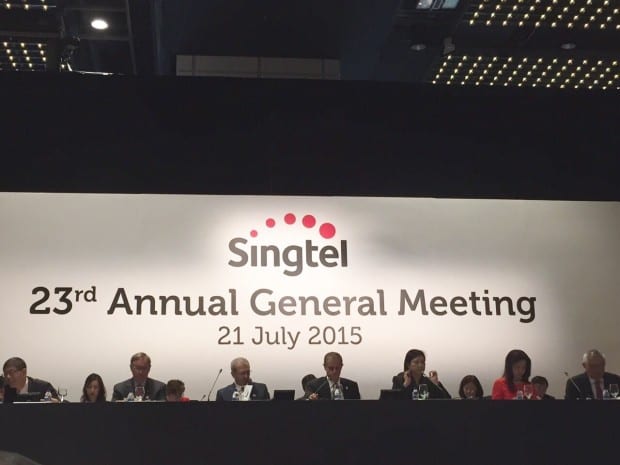

The talk of the town in recent months in the telco industry is the impending entrance of a fourth telecommunications company in Singapore and the online backlash surrounding Singtel CEO’s, Chua Sock Koong, high remuneration. Ms Chua took home a salary of S$1.68 million and a variable bonus of S$3.83 million for the year.
These two questions were immediately brought up by one shareholder during Singtel’s AGM:
“There is a news coming out that a fourth operator is coming in. How does that affect Singtel and why is the CEO’s variable remuneration more than the fixed remuneration. Can the board explain how the remuneration committee conduct their checks and balances to ensure that the compensation is correct.”
There were also other concerns raised by other shareholders about disruptive technology, the smart nation programme, growth in China, etc. So here are…
10 Quick Things I Learned From Singtel’s AGM 2015:
- On the impact of a fourth telco in Singapore, CEO Chua Sock Koong felt that market penetration for telcos is already very high in Singapore and there is no need for another operator. The existing telcos have made significant investments in building network infrastructure which reflects the level of quality service and competitive pricing among the telcos. She also mentioned that Singtel takes competition seriously and that the company has come a long way from the days when Singtel was the only telco in Singapore. She said that Singtel will continue to remain competitive in the industry by focusing on what is good for the customer: good and reliable coverage, faster speeds, and quality customer service.
- On the reasons why management variable compensation is higher than its fixed compensation, Chairman Simon Israel explained the rationale behind the remuneration:
- First principle: alignment of interests with shareholders
- Second principle: pay for performance
- Third principle: ensure that compensation for the management is competitive across the market
With these three principles in mind, the remuneration committee ensures that the management is compensated based on:
- Fixed salary: benchmarked with market rates
- Short-term performance bonus: this is tracked through a range of financial measures like revenue growth, profitability, and return and aslo other KPIs like quality of network, strategic milestones achieved, and customer satisfaction. Return is compared to risk adjusted cost of capital and if the return exceeds cost of capital, a portion is put into a pool which pays a bonus over three years. If future performance drops below the threshold then the bonus is subjected to clawbacks.
- Long-term performance bonus: This tracks the return of shareholders to the market.
- One shareholder asked why Singtel did not expand into China’s telecommunication industry. The CEO explained that China’s communication market is not a very conducive market for foreign operators. What Singtel has done instead is have their sales offices service customers who require telecommunications in China and work with local operators in China to deliver those services.
- CEO Chua Sock Koong agrees that the data center business is an important segment for telcos. Singtel does own and operate a number of data centers in Singapore.
- Singtel considers their remittance business as a complimentary service to their prepaid mobile services. The profile of Singtel’s prepaid mobile customers is mainly foreign workers in Singapore. Singtel provides this extra service to complement their mobile offers and is part of Singtel’s strategy to deepen their relationship with foreign workers. Singtel only offers remittance services to countries where they have a mobile associate partner such as Globe (Philippines) and Telkomsel (Indonesia).
- The topic of disruptive technology was brought up by a few shareholders. The management agrees that digitalization has disrupted Singtel’s business model. However, Singtel will continue to focus on managing their core business well and at the same time look for new growth areas. Singtel has identified three key segments in the digital space: digital marketing, regional premium video services (delivered through their mobile associates), and data analytics. Many of Singtel’s new business operations capitalize on Singtel’s existing business assets and infrastructure including customer touch points, customer analytics, and payment mechanisms.
- Singtel’s HOOQ is the “mobile Netflix”. HOOQ is mainly delivered through mobile devices. The business unit focuses on the emerging markets like India and The Philippines where fixed-line infrastructure is limited but mobile networks are strong.
- Singtel is riding on Singapore’s smart nation programme. The company is well-positioned to handle government projects to build smart nation infrastructure including island-wide sensor network, data centers, and the analytics services required to process the data from the sensors. Singtel has already done projects like these for hospitals and public safety. Singtel is expecting more to come.
- There are some regulatory requirements for Singtel to divest their 75% stake in NetLink Trust by April 2018. This is the timeline given to Singtel by IDA.
- Singtel’s dividend payout has always been 60-75% which translates to about 80% of free cash flow (FCF). In fact, most FCF is used to pay dividends back to shareholders. If Singtel makes a special gain on asset disposal or any gain out of the ordinary, the board will decide to pay shareholders a special dividend.
Can Singtel handle the heightened competition when Singapore’s fourth telco comes online? Read more here: 6 Things You Need to Know about Singtel



